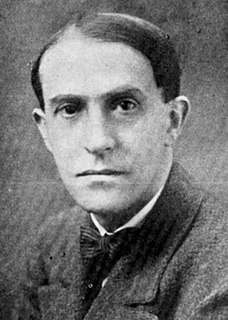A Quote by Seneca the Younger
For what else is Nature but God and the Divine Reason that pervades the whole universe and all its parts.
Related Quotes
I believe that the universe is one being, all its parts are different expressions of the same energy... parts of one organic whole.... (This is physics, I believe, as well as religion.) The parts change and pass, or die, people and races and rocks and stars; none of them seems to me important in itself, but only the whole. This whole is in all its parts so beautiful, and is felt by me to be so intensely in earnest, that I am compelled to love it, and to think of it as divine.
Because the divine goodness could not be adequately represented by one creature alone, God produced many and diverse creatures, that what was wanting in one in the representation of the divine goodness might be supplied by another. For goodness, which in God is simple and uniform, in creatures is manifold and divided. Thus the whole universe together participates in the divine goodness more perfectly and represents it better than any single creature.
By `God` I mean godliness; the whole existence is full of godliness. And when you will come to know, you will not see a god standing before you, you will see the trees as divine, the rocks as divine, the people as divine, the animals as divine. God is spread all over the place, from the pebble to the star, from the blade of grass to the sun - it is all divine.
Siphonophores do not convey the message a favorite theme of unthinking romanticism that nature is but one gigantic whole, all its parts intimately connected and interacting in some higher, ineffable harmony. Nature revels in boundaries and distinctions; we inhabit a universe of structure. But since our universe of structure has evolved historically, it must present us with fuzzy boundaries, where one kind of thing grades into another.
Nature always takes you at your own valuation. Believe you are the child of God-really believe it. Believe that you express Divine Life, Divine Truth, and Divine Love. Believe that Divine Wisdom guides you. Believe that God is your supply. Believe that God is helping and blessing humanity through you. Believe that you are a special enterprise on the part of God and that he is opening your way-and what you really believe, that you will demonstrate.
What we call music in our everyday language is only a miniature, which our intelligence has grasped from that music or harmony of the whole universe which is working behind everything, and which is the source and origin of nature. It is because of this that the wise of all ages have considered music to be a sacred art. For in music the seer can see the picture of the whole universe; and the wise can interpret the secret and nature of the working of the whole universe in the realm of music.
All things are linked with one another, and this oneness is sacred; there is nothing that is not interconnected with everything else. For things are interdependent, and they combine to form this universal order. There is only one universe made up of all things, and one creator who pervades them; there is one substance and one law, namely, common reason in all thinking creatures, and all truth is one-if, as we believe, there is only one path of perfection for all beings who share the same mind.
An ignorant man believes that the whole universe only exists for him: as if nothing else required any consideration. If, therefore, anything happens to him contrary to his expectation, he at once concludes that the whole universe is evil. If, however, he would take into consideration the whole universe, form an idea of it, and comprehend what a small portion he is of the Universe, he will find the truth. There are many ... passages in the books of the prophets expressing the same idea.
Our life of contemplation shall retain the following characteristics: —missionary: by going out physically or in spirit in search of souls all over the universe. —contemplative: by gathering the whole universe at the very center of our hearts where the Lord of the universe abides, and allowing the pure water of divine grace to flow plentifully and unceasingly from the source itself, on the whole of his creation. —universal: by praying and contemplating with all and for all, especially with and for the spiritually poorest of the poor.








































